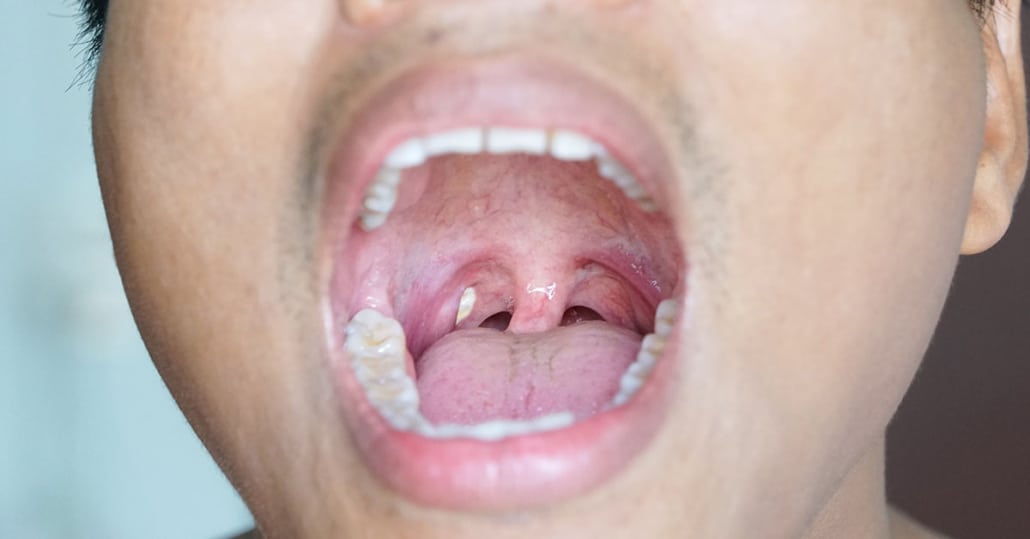Do Tonsil Stones Cause Bad Breath?
Let’s take a step back and answer the first question you’re probably asking: What are tonsil stones? Sometimes recognized by their technical name of tonsilloliths, tonsil stones are a buildup of particles, like food, left behind in your mouth that gets stuck in your tonsils.
These deposits may seem to appear out of nowhere. They have a side effect: bad breath. Tonsil stones have no real cure, unless you want to have your tonsils surgically removed, so it’s important to know how to recognize and treat tonsil stones to help prevent bad breath.
What are tonsils?
Tonsils are the small, oval-shaped mounds of tissue on each side of the back of your throat. Normal tonsils are about the same size and have a healthy pink color. Tonsils work as part of your body’s immune system and help prevent bacteria and viruses from entering your body through the mouth.
What Causes Tonsil Stones?
Tonsils can have deep pockets and folds where food particles, mucus, and other substances can get stuck. Tonsil stones form when trapped particles start to harden and look like white or yellow masses. Tonsil stones may cause:
- Difficulty swallowing
- Ear pain
- Sore throat
- Tonsil swelling
Unlike stones that develop in other parts of the body, tonsil stones are generally harmless. They can range in size, and smaller stones usually go undetected.
Tonsil Stone Symptoms
Not everyone experiences symptoms of tonsil stones. If you have symptoms, you may notice:
- A feeling as if something is stuck in your throat
- Pressure or pain in your ears
- White dots or specks on your tonsils
- Lingering sore throat
How Do Tonsil Stones Cause Bad Breath?
Bad breath is one of the most noticeable symptoms of tonsil stones. Tonsil stones contain bacteria that create volatile sulfur compounds (VSCs), which cause foul-smelling breath.
Research suggests that tonsil stones increase the risk of elevated concentrations of VSCs by approximately 10 times.
How to Get Rid of Tonsil Stones
If your tonsil stones aren’t visible or causing pain, you don’t need to treat them. If you have larger tonsil stones or experience discomfort, you can try a few home remedies.
- Gargle with warm saltwater
- Gently remove the tonsil stones with a sterile cotton swab
- Irrigate the area with a water flosser
Always push stones toward the front of your mouth, so you don’t swallow them. Don’t use your finger, tweezers, or other sharp objects, because you could cause damage.
If you are unsure about whether you have tonsil stones, contact your doctor. They may have other options for stone removal, including:
- Laser resurfacing
- Irrigation with saline
- Curettage, which scoops out the stone
Full removal of your tonsils is only recommended as a last option if you experience recurring stones, severe breathing problems, large stones, or chronic strep throat. Talk with your doctor before you choose surgery because it comes with risks, and recovery will take longer.
Causes of Bad Breath
Bad breath results from VSCs released by the bacteria in your mouth. Sulfur gas may be present in the mouth due to many potential reasons.
- Food left between the teeth and gums
- Smoking and chewing tobacco
- Dry mouth
- Serious illnesses and diseases
- Medications
- Infections from mouth sores or decayed teeth
Tonsil stones only account for about 3 percent of cases of bad breath.
How to Help Prevent Bad Breath From Tonsil Stones
Brush and floss twice per day to keep food from getting trapped in your tonsils. Clean your tongue to help reduce any particle buildup. Use SmartMouth Oral Rinse, which is specially formulated to eliminate VSCs in your mouth. It can help keep your mouth clean and relieve the symptoms of bad breath.
Conclusion
Tonsil stones can lead to more than just bad breath, but if you stick to your dental care routine, you can help protect your tonsils. See your doctor if you have concerns about your tonsils.
Sign up today for coupons, offers and updates!
At SmartMouth, we love saving you from bad breath, but we also love saving you money.
Reviewed By
Dr. Elizabeth Clary, D.M.D. is a member of the American Dental Association, Missouri Dental Association, Missouri Academy of Pediatric Dentistry, Chicago Dental Society, Greater St. Louis Dental Society, and Southern Illinois University School of Dental Medicine Alumni Association.



